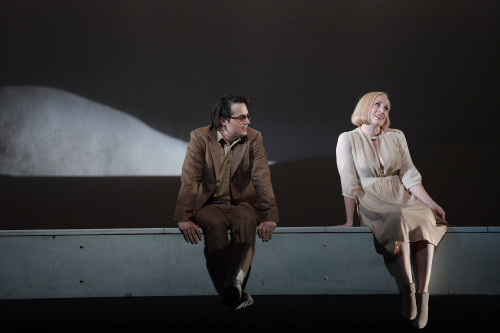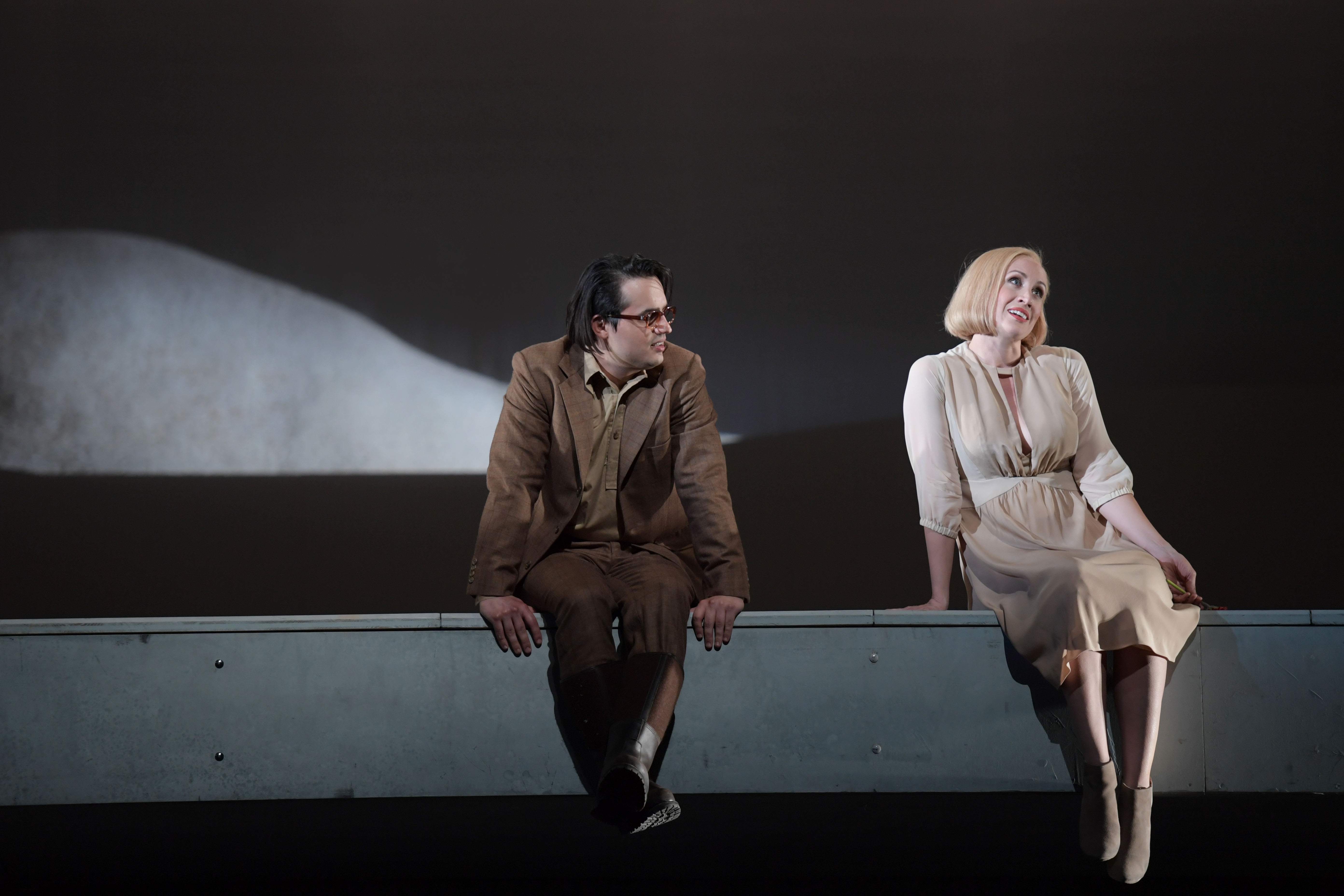 United Kingdom Bellini, La sonnambula: Soloists, Chorus, and Frankfurt Opera and Museum Orchestra / Eun Sun Kim (conductor), 21.4.2018. (GT)
United Kingdom Bellini, La sonnambula: Soloists, Chorus, and Frankfurt Opera and Museum Orchestra / Eun Sun Kim (conductor), 21.4.2018. (GT)

Cast:
Amina – Brenda Rae
Elvino – Ioan Hotea
Rodolfo – Khwan Sim
Lisa – Elizabeth Sutphen
Teresa – Katharina Magiera
Alessio – Thesele Kemane
Notary – Jaeil Kim
Production:
Director – Tina Lanik
Stage Director – Hans Walter Richter
Costume director – Stefan Hageneier
Lighting director – Olaf Winter
Choirmaster – Tilman Michael
Choreography – Mareike Wink
This production by Tina Lanik of Bellini’s semiseria opera dates from November 2014, and based on my hearing, this first revival of La sonnambula allowed new audiences to hear some outstanding individual performances of world-class standards. Of course, stagings of this opera are rare to find for the deficiency of true coloratura sopranos, or more likely the type of singer that this opera was written to develop the careers of Giovanni Battista Rubini and Giuditta Pasta in 1831, as well as Maria Malibran as a genuine soprano sfogato. It was only the appearance of magnificent singers like Maria Callas and Joan Sutherland that inspired revivals of Bellini’s operas in the second half of the 20th century after decades of neglect after Jenny Lind and Toti dal Monte proved outstanding interpreters of Bellini’s heroine Amina. This was the first staging of the opera in Frankfurt, and this revival presented many of the performers from three seasons ago.
The opening passage saw the heroine Amina walking slowly from left to right as a great grey wall revealed gradually the setting of the village set in the Swiss Alps with snow falling in the background. The staging is unpretentious with the impression of a mountain village with a screen at the back and the secondary level raising or lowering to create the idea of a mountain or wall with several scenes confined to the area below. Entry for the performers was through several doors on either side, and at the beginning of the first and the close of the second act, a great screen opened and closed. The colour scheme was of light greys and white tones. The villagers were attired in furs and hats as if we were in Russia rather than in Switzerland. If this staging appeared rather unsophisticated, it permitted the audience greater attention to the music than the surroundings.
The Lisa of American Elizabeth Sutphen presented outstanding acting, and brilliant singing, notably with her aria ‘All joy is merriment…I alone am miserable’ depicting her plight as a lonely young woman searching for happiness yet scorned by men. The anticipation of Amina’s wedding by Brenda Rae was finely characterised in her aria, ‘How brightly this day dawned for me’ and that of her beau Elvino’s first arioso ‘Oh forgive me, my beloved’ was exquisitely sung by the young Romanian lyric tenor. The Korean Kihwan Sim (who I heard here three years ago as Figaro) boasts a wonderful lyric baritone, both in intonation and in characterisation of Rodolfo, suitably with his opening ‘O lovely scenes, again I see you…’ in admiration of Amina. Elvino and Amina’s duet ‘I envy the wandering breeze…’ was beautifully sung with a sensitive portrayal of the tenor’s jealousy for Rodolfo. The denouement of the Act I came with Amina’s ‘How happy the people are…’ during her eerie sleepwalk before Rodolfo’s hasty departure. Elvino’s shows his discovery of her apparent treachery through his anger and despair as the villagers turn away from Amina in disgust. ‘Heaven keep you from feeling the pain I feel now’ brought the first act to a powerful close with magnificent singing from the impressive chorus of villagers.
The emotional power of this production was amplified in Act II, revealing the Elvino of the Romanian Ioan Hotea as a great lyrical tenor, while Lisa continued to display an excellent coloratura, and a real star in the making with a remarkable stage presence, handling the trills and runs of the score with consummate ease; often one was drawn to her tragically drawn plight as the perpetually thrown over woman, more than Amina.
Amina was sung by the young American coloratura soprano Brenda Rae; her voice is fabulous and got even better the longer the evening progressed, and she portrayed well the part of a woman in despair with her heart-rending aria of ‘I did not believe you would fade so soon, my flower’. The mischievous nature of Lisa is encapsulated when she shows her delight at marrying Elvino, but it is short-lived when Rodolfo announces Amina is a sleepwalker ‘I cannot deny, my Lord, what my eyes have seen.’ Quickly the entire scene changes and Elvino declares his love again for Amina who now sings her final aria of happiness, ‘Human thought cannot conceive of the happiness that fills me’ sung with incredible facility by the American soprano and resulting in a standing ovation. She was but one of several stars: making his debut here was Thesele Kemane in the role of Alessio, a member of the Oper Frankfurt Opera studio, and who gave a particularly fine portrayal as did the Teresa of Katharina Magiera (who was singing again just a night after her performance in Das Rheingold), and the Notary of Jaell Kim.
If the magnificent vocal gifts of Ms Rae gained the greater plaudits here, it seems to me the Lisa of her compatriot Ms Sutphen has the bigger future ahead for uniting remarkable stage presence with a superb voice, whilst Ms Rae, in the role of Amina, took time to get into the part but proved technically supreme in the highest notes. The performance throughout of Frankfurt Opera’s Chorus was pivotal; their singing in harmony and acting was magnificent. They were well assisted by the Frankfurt Opera and Museum Orchestra who sounded like a different ensemble from the previous Wagner evening: they assumed the lighter classical Italianate harmonies sounding wholly differently, a result of the wonderful direction of the conductor, the young Korean Eun Sun Kim, who brought the whole performance together with her beautifully flowing movements, clear decisive gestures in the swift changes in tempi, maintaining the melodrama and momentum of Bellini’s score. Her performance was one of the night’s great successes; she has a fine sense of rhythm, marvellous judgment of the score and is a great prospect on the international concert and opera circuit. Overall this was a magnificent presentation of Bellini’s opera and fittingly shows off the world-class singing and performance standards of Frankfurt Opera.
Gregor Tassie
